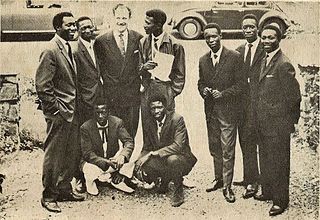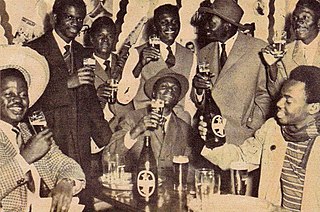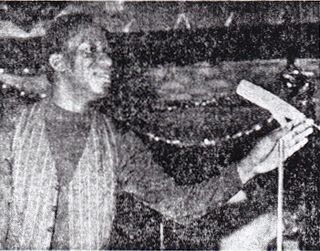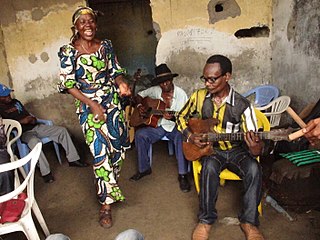
Congolese music is one of the most influential music forms of the African continent. Since the 1930s, Congolese musicians have had a huge impact on the African musical scene and elsewhere. Many contemporary genres of music, such as Kenyan Benga and Colombian Champeta, have been heavily influenced by Congolese music. In 2021, Congolese rumba joined other living traditions such as Jamaican reggae music and Cuban rumba on UNESCO's "intangible cultural heritage of humanity" list.

Soukous is a genre of dance music originating from the Democratic Republic of the Congo and the Republic of the Congo. It derived from Congolese rumba in the 1960s, with faster dance rhythms and bright, intricate guitar improvisation, and gained popularity in the 1980s in France. Although often used by journalists as a synonym for Congolese rumba, both the music and dance associated with soukous differ from more traditional rumba, especially in its higher tempo, song structures and longer dance sequences.

Le Grand Kallé et l'African Jazz, often simply referred to as African Jazz, was a popular and extremely influential Congolese rumba band from the modern-day Democratic Republic of the Congo. Founded in 1953 in Léopoldville under Belgian colonial rule, the band was led by Joseph Kabasele Tshamala, popularly known by his stage name Le Grand Kallé. The group saw its heyday between 1958 and 1962, after which it was hit by defections by its members in 1963. It was briefly revived after 1966.

OK Jazz, later renamed TPOK Jazz, was a Congolese rumba band from the Democratic Republic of the Congo established in 1956 and fronted by Franco. The group disbanded in 1993, but reformed in 1996.
Sam Mangwana, is a Congolese-born musician, born to Angolan parents. He was the frontman of his bands Festival des Maquisards and African All Stars. Mangwana was a member of François Luambo Makiadi's seminal band TPOK Jazz, and Tabu Ley Rochereau's bands African Fiesta, African Fiesta National and Afrisa International.

Pascal-Emmanuel Sinamoyi Tabu, better known as Tabu Ley Rochereau, was a leading African rumba singer-songwriter from the Democratic Republic of the Congo. He was the leader of Orchestre Afrisa International, as well as one of Africa's most influential vocalists and prolific songwriters. Along with guitarist Dr Nico Kasanda, Tabu Ley pioneered soukous and internationalised his music by fusing elements of Congolese folk music with Cuban, Caribbean and Latin American rumba. He has been described as "the Congolese personality who, along with Mobutu, marked Africa's 20th century history." He was dubbed "the African Elvis" by the Los Angeles Times. After the fall of the Mobutu regime, Tabu Ley also pursued a political career. His musical career ran parallel to the other great Congolese rhumba bandleader and rival Franco Luambo Makiadi who ran the band TPOK Jazz throughout the 1960s, 1970s and '80s.

Joseph Athanase Tshamala Kabasele, popularly known as Le Grand Kallé, was a Congolese singer and bandleader, considered the father of modern Congolese music. He is best known for his role as leader of the band, Le Grand Kallé et l'African Jazz, in which capacity he was involved in a number of noted songs, including Indépendance Cha Cha.

Nicolas Kasanda wa Mikalay, popularly known as Docteur Nico, was a guitarist, composer and one of the pioneers of Congolese music. He was born in Mikalayi in the Belgian Congo. He graduated in 1957 as a technical teacher, but inspired by his musical family, he took up the guitar and in time became a virtuoso soloist.

Congolese rumba, also known as African rumba, is a dance music genre originating from the Republic of the Congo and Democratic Republic of the Congo. With its rhythms, melodies, and lyrics, Congolese rumba has gained global recognition and remains an integral part of African music heritage. In December 2021, it was added to the UNESCO list of intangible cultural heritage.
Joseph Kiambukuta Londa, known as Josky Kiambukuta, was a Congolese performing artist, singer, songwriter and composer. As a member of TPOK Jazz he played alongside Franco during their most popular period in the mid-1960s until the late 1980s.
Jean de Dieu Makiese, popularly known as Madilu System, was a Congolese rumba singer and songwriter, born in what was then Léopoldville, Belgian Congo. He was once a member of the seminal band TPOK Jazz which dominated the Congolese scene from 1960s through 1980s.
Simaro Massiya Lutumba Ndomanueno, known as Simaro, was a Congolese music rhythm guitarist, songwriter, poet, composer, and bandleader. He was a member of the seminal Congo music band TPOK Jazz, which dominated the music scene in the Democratic Republic of the Congo (DRC) from the 1960s to the 1980s.
Malage de Lugendo is a Congolese soukous recording artist, composer and vocalist. He was a member of François Luambo Makiadi's seminal band TPOK Jazz, and Tabu Ley Rochereau's band Afrisa International.
Empompo "Deyesse" Loway, was a Congolese soukous recording artist, composer and saxophonist. He was a member of the soukous band TPOK Jazz, led by Franco Luambo, which dominated the Congolese music scene from the 1950s through the 1980s.
Mavatiku Michelino Visi, commonly known as Michelino, is a soukous recording artist, composer, guitarist and vocalist, in the Democratic Republic of the Congo (DRC). He was a member of the Congolese band African Fiesta Nationale, which was later renamed Afrisa International, led by Congolese music superstar, Tabu Ley. Later, in the early 1970s, Michelino left Afrisa and joined TPOK Jazz, led by François Luambo Makiadi, which dominated the Congolese music scene from the 1950s through the 1980s.
African Jazz Mokili Mobimba was a popular song written in the Congolese rumba style by Charles Mwamba Déchaud and performed by Joseph Kabasele's band, African Jazz.
Kamulangu is a Luba folk song sung in the Tshiluba language. It has an associated traditional dance.
Syran Mbenza is a guitarist, originally from the Democratic Republic of the Congo, who has lived in Paris since about 1981. He has recorded and performed prolifically over five decades, including as a solo artist; as one of the four members of the popular soukous "supergroup" Les Quatre Étoiles; as a founding member of the acoustic, Congolese rumba revival band Kékélé; in other bands; and in support of numerous artists. He has been described as one of the greatest guitar players of Africa.

Jolie Detta Kamenga Kayobote, professionally known as Jolie Detta or Evangeliste Myriam, is a Congolese singer-songwriter, dancer, and evangelist. She made her music debut with Choc Stars between 1983 and 1984.








